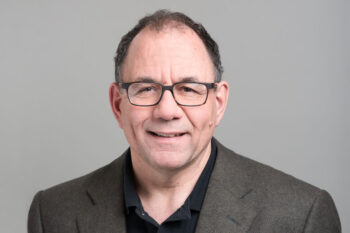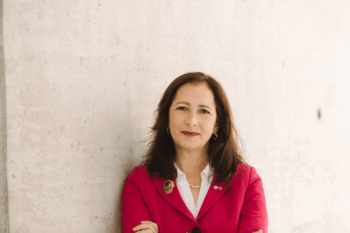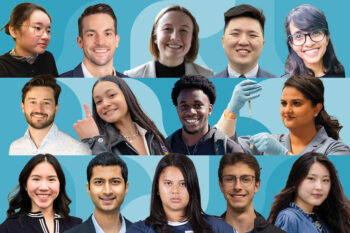In celebration of Black History Month, U of T Engineering invited students and alumni from the U of T Engineering community who identify as Black to reflect on their time in our Faculty and share their thoughts on the broader engineering profession. Their candid responses illuminate their diverse range of lived experiences and an ongoing need for systemic change. Some of the responses have been edited for length and clarity.
Dimpho Radebe (IndE 1T4 + PEY)

I am fortunate to have a diverse background: I am half South African and half Canadian, and I have lived in both South Africa and Canada. I chose U of T because of its reputation as a global leader in engineering education and for the diversity that the university and city of Toronto offer. I enrolled in Industrial Engineering to understand how technical engineering could be directly linked with human behaviour through human-centred design.
As a Black female engineering student at U of T, I was surrounded mostly by men, and there were very few Black students besides myself. This made me highly aware of the need for more diverse representation. Throughout undergrad, I struggled with contradictory feelings. While I wanted to be embraced by the engineering community, I also felt that there was something deeply wrong.
When I look back and consider how few Black engineering students made it through to graduation, how even fewer pursued graduate studies, and the sentiments that many of them hold towards their time at U of T Engineering, I can see that there is a definite need for change in the attitudes of both students and the administration towards Black engineering students.
In high school, I could not see the connection between engineering and people. Now I know that everything that engineers do has an impact on people, society and the environment. It is imperative that U of T Engineering graduates understand the diverse perspectives of people both within and outside their community. We need more than just acceptance: we need a celebration of these differences. Instilling these values will encourage U of T Engineering graduates to consider the impact they are having, resulting in systemic, positive change.
In addition to my engineering degree, I hold a Master’s in Management from the University of Bath. I am currently a Senior Analyst in Cancer Screening Implementation at Cancer Care Ontario. My diverse background and experiences have profoundly shaped my perspectives and my passion to work with others to ensure equitable access to — and the continuous strengthening of — high-quality public systems.
I hope, one day soon, to see an inclusive environment at U of T Engineering and throughout the engineering community. This would be an environment in which any individual or group would feel welcomed, respected, supported and valued.
Beniam Tefferi (CivE 1T2 + PEY)

I chose U of T Engineering because staying home in Toronto where I was born and raised made the most sense for me. I always liked math and physics, and U of T had one of the best reputations in terms of engineering.
Being a minority in engineering, or in any program, is not easy. As a Black student, joining the National Society of Black Engineers (NSBE) was one of the best decisions I ever made. It allowed me to meet and spend time with people who had the same cultural background as me, and with whom I could identify. Spending time with them and learning from them was instrumental to my success. It made my life easier.
Today I am working for the City of Toronto in Development Engineering. Looking back, I feel that there was lots of diversity at U of T Engineering, but there were very few Black students. Everyone was so busy studying that they didn’t spend too much time thinking about these issues, at least outside of NSBE. It would be great to see more collaboration between student groups and more equal sharing of resources among them.
“We need more than just acceptance: we need a celebration of these differences.”
— Dimpho Radebe (IndE 1T4 + PEY)
Samson Kirk-Koffi (CompE 1T8)

I am a Ghanaian-Canadian. I moved to Canada from Ghana at the age of 18 to enrol in university. I chose U of T because I believed it was the best engineering school in Canada, and that it would enable me to make the most of the opportunities my Canadian citizenship presented me.
My experience as a Black student at U of T Engineering was very isolating; I do not remember feeling very at home or a sense of belonging in the Faculty. Perhaps it was partly my own reluctance or insecurity, but my impression was that the faculty celebrated only excellence. This is as it should be, however students struggling to find their own way require community support and I yearned for that kind of community support. Had I found it, I would have been OK but it felt like the faculty had more interest in celebrating success rather than nurturing students. Most of the time it felt like they were saying, “tough luck.”
In hindsight, I believe the incentive for the Faculty is to develop grit in their prospective graduates, and for that I am very grateful. However, there should be some consideration for young people who may have already exhibited some of the intended excellence to get to this stage. I think that it might be mutually beneficial for the Faculty to play a more nurturing role, or at least to ensure that that side of things is just as empowered as the celebration of excellence.
I cannot say all this without acknowledging some individuals in the faculty that helped me on my journey. In particular, I am grateful to Khuong Doan, for his guidance during a particularly challenging period in my life, and to Professor Dimitrios Hatzinakos for giving me a chance to prove myself.
With respect to diversity and inclusion, I feel efforts should be organic. In part, it is a numbers game: groups with more members become more visible and over time feel more at home. People need to see that they belong, not just be told that they belong. Perhaps more senior faculty (like professors and industry experts) who identify as Black will help in this regard. We need to empower those who may be struggling. At the same time, the Faculty needs to be more aware of the cultures developing among students. They should mindfully address issues of cultural tension when they arise.
Today, I am working as a software engineer. I would like to see UofT Engineering become an institution that is dedicated to empowering students and molding them into the kind of leaders the world needs. The introduction of social issues and philosophy into the education of engineers is more urgent than ever before. It is not enough to train people who are capable of finding solutions: engineering graduates must also be aware of ethics and social effects of the solutions they build. Empathy might prove to be the most important skill of a 21st century engineer.
Nicole Deterville (Year 4 ChemE + PEY)
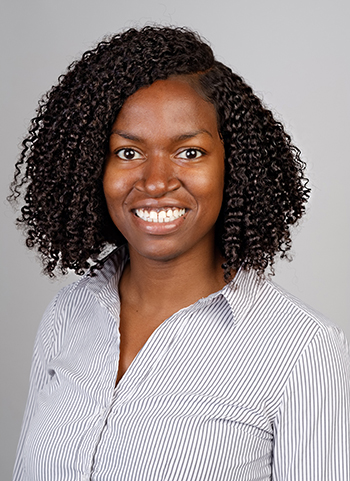
I was born and raised in Toronto but my parents are from St. Lucia and Trinidad. I chose U of T Engineering mainly for the Professional Experience Year Co-op (PEY Co-op) program and the ability to graduate university with relevant professional experience.
I remember my first Engineering Strategies and Practices (ESP) class during first year. It was in Convocation Hall and there were around 800 to 1,000 students in attendance. I started to look around to see if there were any other Black students and counted only a couple in the entire class.
I realized the same trend throughout all my other classes, which brought me to NSBE. The organization allowed me to see that even though the university is lacking in diversity in regards to Black students, there are thousands out there who are collectively working to achieve NSBE’s mission.
I feel like in regards to gender diversity, U of T Engineering does an amazing job. The Faculty keeps track of statistics and makes sure to roll out various initiatives to increase the number of female students admitted to engineering.
However, in regards to collecting race-based data, it is almost impossible to find any information on progression throughout the years. This makes it even harder to determine whether the current efforts are actually making a difference.
“People need to see that they belong, not just be told that they belong.”
— Samson Kirk-Koffi (CompE 1T8)
Joshua Pius (Year 2 ElecE)
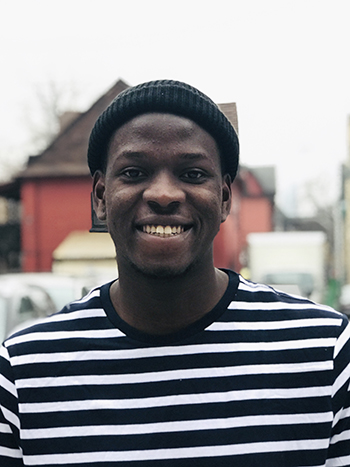
I was born in Nigeria and immigrated to Canada in 2011 with my entire family. I chose U of T Engineering for various reasons, such as its prestigious reputation and its high standard.
As a Black student at U of T Engineering, I felt that the community was truly inviting and welcoming. I always felt like opportunities were opened to me, and I never felt restricted even though I was a visible minority. U of T Engineering does, however, lack fellow Black students. This was a very different experience for me — I was used to having a clique of fellow Black students who could offer guidance and relate to me on a deeper level because of our shared experiences.
U of T Engineering is diverse, there are a variety of students from all over the world with different backgrounds and from multiple different countries. But the representation of Black engineers is still very small. There is such a small group of Black students within engineering that we all know each other. I would love to see at U of T Engineering achieve more Black engineering students, such that meeting another Black engineering student is not a novelty to us. I also think there needs to be more Black representation in academic leadership roles. With that being said, I want to commend U of T Engineering for the community it has built. I never once felt attacked as a Black student — yes there were comments now and then — but never a straight-up attack on my ethnicity.
I am very involved in the engineering community at U of T and strive to be a role model for fellow Black students or to anyone who feels like a minority. I want to be someone to look up to, an encouraging voice that lets others know that they, too, can make a positive impact at U of T Engineering.
I am currently an ECE Ambassador, which means I represent the department at formal events, answering any questions pertaining to engineering or U of T as a whole. I am also the Region 1 (GTA area) senator for NSBE. This way, I am in direct contact with other universities to ensure Black students in my region are treated well.
After I graduate, I want to work for a startup or a large IT company, writing code to support their infrastructure. I then want to use my earnings to fund projects for my family in Nigeria. These include constructing houses in the village, and funding my family’s education, because knowledge is power.
Akira Neckles (ChemE 1T7 + PEY)
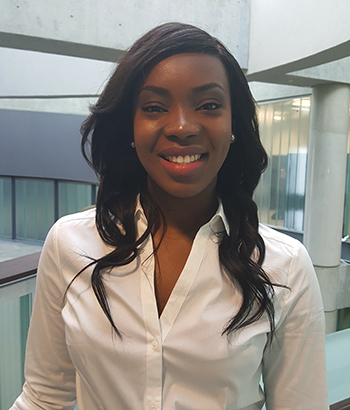
I was born and raised in Grenada. As a young girl growing up, I was always interested in science and math compared to arts and language. I chose engineering mainly because I loved the sciences and I enjoyed formulating new ideas, fixing and building things. Why U of T Engineering? It’s ranked #1 for engineering in Canada and is one of the top engineering schools in the world.
When I started engineering in 2011, I was really shocked and disheartened by the low number of Black students studying engineering. It really came as a surprise to me as I grew up in a country that is predominantly Black. There were only four Black students in my class when I started engineering. It was definitely hard for me to accept the reality because I left like I didn’t belong and it was also hard to make friends and socialize when you are viewed as a minority by your peers. But as I met other Black students from other programs and I joined student groups, such as NSBE, I started to gain a sense of belonging.
At the start of my engineering journey, I felt like diversity was a huge issue at U of T Engineering. There were little-to-no programs focused on increasing Black student admissions at U of T and Black empowerment.
However, over the years this has changed. Black students have been given the power to make changes, such as ENGage, a U of T Engineering outreach program that focuses on increasing the awareness of STEM education within the Black community, as well as U of T’s Black Graduation event, which recognizes Black students who have made tremendous contributions to the development and sustainability of the Black community at the university.
After graduating in 2017, I’ve been working in the financial industry as a data governance analyst.
Nyat Habtit (Year 4 ChemE + PEY)
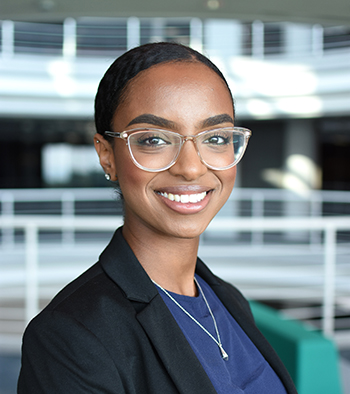
I’m from Toronto, and when it was time to choose where to study engineering, I wanted to pursue it at a prestigious university.
I think U of T Engineering has a lot of diversity amongst the student body and faculty in terms of religion and race. I also think it’s amazing how U of T Engineering has so many different student groups that allow students of different backgrounds and interests to connect. However, I would like to see the Faculty make more of an effort to celebrate the diversity found in our community.
Oritsetimeyin Agbeyegbe (IndE 1T3 + PEY)
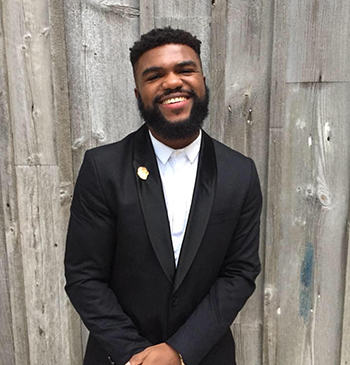
I was born and raised in Lagos, Nigeria. I chose U of T Engineering because of its prestige and the respect the name garners. I also chose it because it is located in downtown Toronto where opportunities are endless.
I was often one of just a handful of Black engineering students walking the halls so I felt I always stood out. This gave me added drive to succeed and prove that I belonged. I also felt driven to help increase the number of Black engineering students at U of T. This is why I joined NSBE, where I made lifelong friends and helped grow programs that will hopefully achieve this goal.
Everyone was very welcoming and understanding of the many cultures that roamed the halls. I am very lucky to have made friends from all over the world. Also, the Engineering Outreach Office had great leadership that was very open to the ideas of minority groups, which enabled programs that were geared towards diversity outreach. I would like to see the work of the Outreach groups be celebrated and highlighted more, so that growth can continue to happen.
Today, I work as a project manager in digital advertising. Looking back on my time here, I feel I’ve met amazing people at U of T Engineering. I had many long nights. I had fun. I doubted myself. All things considered, I made it to the end and I wouldn’t trade my experiences for anything in the world.
Tolbert Akanni (ChemE 1T6 + PEY)
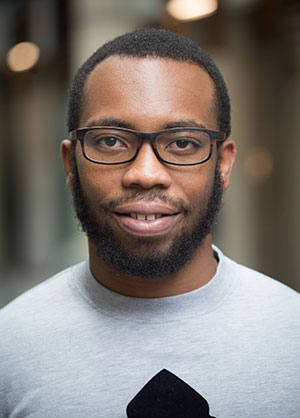
I am from Ghana and chose U of T Engineering because it is the top-ranked engineering school in Canada. Today, I am working for Ontario Power Generation.
Joining NSBE helped make my experience as a Black international student fulfilling and inclusive. That said, I believe there is room for improvement in terms of diversity and inclusion. One thing that could help would be more discussion between faculty leadership and Black students.

